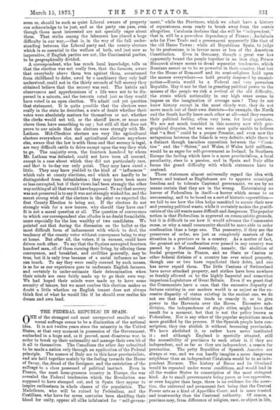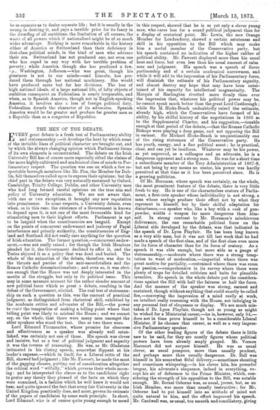THE FEDERAL REPUBLIC IN SPAIN.
filsTE of the strangest and most unexpected results of uni-
versal suffrage seems to be a diminution of the national idea. It is not twelve years since the minority in the United States, at that very moment in possession of the Government. embarked in a huge and, as it proved, most disastrous war, in order to break up their nationality and manage their own bit of it all to themselves. The Canadians the other day submitted to be made a nation only through an application of the Federal principle. The masses of Italy are to this hour provincialists, and are held together mainly by the feeling towards the House of Savoy, the,dread of the foreigner, and the restriction of the suffrage to a class possessed of political instinct. Even in France, the most homogeneous country in Europe, the war revealed the Federal tendencies which the Revolution was supposed to have stamped out, and in Spain they appear to inspire enthusiasm in whole classes of the population. The Madnlenos, who will be ruined by Federalism, and the Castilians, who have for seven centuries been shedding their blood for unity, appear all alike infatuated for "self-govern-
went," while the Provinces, which we admit have a history of separateness, seem ready to break away from the centre altogether. Catalonia declares that she will be "independent," that is, will be a powerless dependency of France ; Andalusia asks for Free Trade and a government apparently like that of the old Hanse Towns ; while all Republican Spain, to judge by its professions, is in favour more or less of the American Constitution. Even in Germany, though a great war has apparently bound the people together in an iron ring, Prince Bismarck always seems to dread separatist tendencies, which Russians assure us to be so powerful in their country, that but for the House of Romanoff and its semi-religious hold upon the masses everywhere—a hold greatly deepened by emanci- pation—Russia would be a Federal and very powerless Republic. May it not be that in granting political power to the masses of the people we risk a revival of the old difficulty, the strain which nationality in any high sense seems to impose on the imagination of average men ? They do not know history except in the most cloudy way, they do not move much out of their own districts—for example, the North and the South hardly knew each other at all—and they reserve their political feeling, often very keen, for local questions. We are not much troubled in this country now with geo- graphical disputes, but we were once quite unable to believe that "a Scot " could be a proper Premier, and even now the antagonism between the Islands is very definite, while there is a distinct though harmless opposition between the " Coun- ties " and the " Shires," and Wales, if Wales held millions, would be as eager for self-government as Ireland. In Southern Europe the feeling which here is a mere provincialism, a local peculiarity, rises to a passion, and in Spain and Italy alike forms the grand difficulty with which statesmen have to contend.
Those statesmen almost universally regard the idea with horror, and trained as Englishmen are to approve municipal freedom and to tolerate Cantonal government, we are by no means certain that they are in the wrong. Entertaining no horror of Federalism in itself—a horror which seems to us unreasoning, and to be based on a sort of historic superstition— we fail to see how the idea helps mankind to secure their new and pressing political wants, while it certainly makes the gratifi- cation of the old wants more difficult and dangerous. Thepopular notion is that Federalism is approved on communistic grounds, but it is difficult to see how it would advance the Communist cause, or why a small community should be more able to order confiscation than a large one. The peasantry, if they are the preservers of order, are just as completely masters of the situation in a province as in a country. As a matter of fact, the greatest act of confiscation ever passed in any country was passed by a National Assembly, namely, the abolition of feudal properties in France, and no State or Canton or other federal division of a country has ever seized property, though one or two have repudiated their debts, and one has never repaid them. The little Cantons of Switzerland have never attacked property, and strikes have been nowhere so frankly allowed as by the highly Imperial and somewhat imperious Legislature of Great Britain. Even if we grant that the Communists have a case, that the excessive disparity of fortune existing in our modern world is as unjust as the ex- cessive disparity of status existing in the ancient one, we do not see that subdivision tends to remedy it, or to give power to the Havenots over the Haves. Excessive sub- division, the independence of single cities, might have that result for a moment, but that is not the policy known as Federalism. Nor is any other of the popular aspirations much more gratified by the process. If the Spanish people hate con- scription, they can abolish it without becoming provincials. We have abolished it, or rather have never instituted it ; and although England is specially situated, still the accessibility of provinces to each other is, if they are independent, and as far as they are independent, a reason for precaution. The petty Republics of Spanish America are always at war, and we can hardly imagine a more dangerous neighbour than an independent Catalonia would be to an inde- pendent Navarre. The history of Berne and its Oberland would be repeated under worse conditions, and would lead in all the weaker States to conscription of the most stringent kind. As to small governments being purer, or less oppressive, or even happier than large, there is no evidence for the asser- tion, the universal and permanent fact being that the Central Power acts as a kind of Appellate Court, and is more trusted and trustworthy than the Cantonal authority. Of course, a province may, from difference of religion, race, or object in life,
be so separate as to desire separate life ; but it is usually in the wrong in desiring it, and pays a terrible price for its fancy in the dwarfing of all ambitions, the limitation of all careers, the waste of all powers which if nationalised might be of so much wider advantage. Nothing is more remarkable in the history either of America or Switzerland than their deficiency in first-class political minds, in the kind of men who advance their era. Switzerland has not produced one, not even one who has coped in any way with her terrible problem of poverty ; while America, though she has produced a few, e.g., Washington, Jefferson—who was great, though his greatness is not to our minds—and Lincoln, has pro- duced them through her national machinery. She would have produced more but for her divisions. The loss of high national ideals, of a large national life, of lofty objects of ambition consequent on Federalism is nearly irreparable, and when, as in Spanish America, though not in English-speaking America, it involves also a loss of foreign political duty, Federalism dwarfs the character of its advocates. Spanish America would be far greater and produce far greater men as a Republic than as a congeries of Republics.







































 Previous page
Previous page